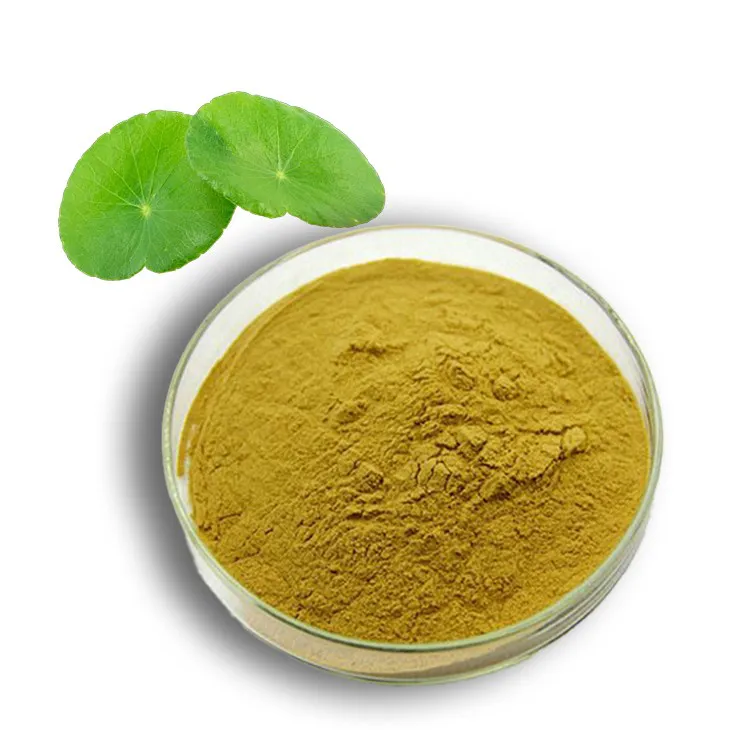- 0086-571-85302990
- sales@greenskybio.com
Use centella asiatica extract? Make sure you source from sustainable suppliers!
2024-12-20

1. Introduction
Centella asiatica, also known as gotu kola, is a herbaceous plant that has been used in traditional medicine for centuries. Its extract is rich in active compounds such as triterpenoids, which are believed to have various health benefits, including wound healing, anti - inflammatory, and antioxidant properties. As the demand for Centella Asiatica Extract in the cosmetic, pharmaceutical, and nutraceutical industries continues to grow, it is crucial to ensure that the sourcing of this valuable ingredient is sustainable.

2. Impact on Local Ecosystems
Over - harvesting: If centella asiatica is harvested without proper management, it can lead to a decline in its natural populations. Over - harvesting can disrupt the balance of local ecosystems, as centella asiatica plays a role in providing habitat and food for various organisms. For example, it may be a food source for certain insects or small mammals. When the plant is over - exploited, these animals may lose an important part of their diet, which can have a cascading effect on the entire ecosystem.
Habitat destruction: In some cases, the methods used to harvest centella asiatica can cause habitat destruction. This may include the use of heavy machinery or improper land - clearing techniques. Such practices can damage the soil structure, reduce soil fertility, and destroy the natural vegetation cover. This not only affects the centella asiatica plants but also other plant and animal species that depend on the same habitat.
Genetic diversity: Unsustainable harvesting may also reduce the genetic diversity of centella asiatica populations. When only a small number of plants are left to reproduce, there is a higher risk of inbreeding, which can lead to weaker and less adaptable offspring. This can make the plant more vulnerable to diseases, pests, and environmental changes in the long run.

3. Fair Trade Practices
3.1. Benefits for Local Communities
Sourcing Centella Asiatica Extract from sustainable suppliers often involves fair trade practices. Fair trade ensures that local collectors and farmers are paid a fair price for their products. This extra income can have a significant impact on the livelihoods of local communities. For example, it can be used to improve access to education, healthcare, and clean water. Local farmers may also be able to invest in better farming equipment and techniques, which can increase their productivity and improve the quality of the centella asiatica they produce.
3.2. Empowering Small - scale Producers
Sustainable sourcing often favors small - scale producers. These producers may have a deeper understanding of the local environment and centella asiatica cultivation. By supporting them, we are promoting a more decentralized and diverse production system. Small - scale producers are more likely to use traditional and sustainable farming methods, which are often better for the environment and the long - term viability of centella asiatica populations. For instance, they may practice intercropping, which can enhance soil fertility and reduce the need for chemical fertilizers.
3.3. Ethical Considerations
Fair trade also involves ethical considerations such as ensuring safe working conditions for those involved in the collection and processing of centella asiatica. Workers should be protected from harmful chemicals, provided with proper training, and have access to appropriate safety equipment. This not only protects the workers but also helps to ensure the quality of the Centella Asiatica Extract, as it is less likely to be contaminated during production.

4. Long - term Availability
Business Continuity: For companies that rely on centella asiatica extract, sustainable sourcing is essential for business continuity. If the plant is over - harvested and its populations decline, there may come a time when it becomes difficult or even impossible to obtain the extract. By sourcing from sustainable suppliers, companies can ensure a steady supply of high - quality centella asiatica extract in the long term. This is particularly important for industries such as cosmetics, where product formulations often rely on consistent ingredient availability.
Meeting Future Demand: The demand for centella asiatica extract is likely to increase in the future as more research reveals its potential health benefits and as consumer awareness of natural and herbal products grows. Sustainable sourcing practices can help to meet this future demand by ensuring that there are healthy centella asiatica populations available for harvesting. This requires careful management of wild populations as well as the promotion of sustainable cultivation methods.
5. How Sustainable Sourcing Benefits Your Business
Enhanced Reputation: Consumers are increasingly conscious of environmental and social issues. By sourcing centella asiatica extract from sustainable suppliers, your business can enhance its reputation as an environmentally and socially responsible company. This can attract more customers, especially those who are willing to pay a premium for products that are sustainably sourced. A positive reputation can also help to build brand loyalty, as customers are more likely to stay with a brand that they perceive as ethical and sustainable.
Reduced Risk: Sustainable sourcing can reduce various risks associated with your supply chain. For example, if you source from suppliers who engage in illegal or unsustainable harvesting practices, your business may be exposed to legal risks, such as fines or product recalls. Additionally, by ensuring the long - term availability of centella asiatica extract through sustainable sourcing, you can avoid the risk of supply shortages, which can disrupt your production and sales processes.
Innovation Opportunities: Working with sustainable suppliers can also open up innovation opportunities. Sustainable suppliers are often more involved in research and development to improve the cultivation and extraction methods of centella asiatica. This can lead to the discovery of new and more effective forms of the extract, which can give your business a competitive edge in the market. For example, new extraction techniques may result in a higher concentration of active compounds or a more stable and bioavailable form of the extract.
6. How Sustainable Sourcing Benefits the Planet
Conservation of Biodiversity: Sustainable sourcing of centella asiatica extract helps to conserve biodiversity. By protecting the plant's natural habitats and ensuring its long - term survival, we are also safeguarding the numerous other species that depend on the same ecosystem. This includes not only animals and plants but also microorganisms that play important roles in maintaining the ecological balance. For example, certain fungi in the soil may be involved in nutrient cycling, and their survival is linked to the health of the centella asiatica - dominated ecosystems.
Climate Change Mitigation: Centella asiatica - rich ecosystems can also play a role in climate change mitigation. Vegetation, including centella asiatica, absorbs carbon dioxide from the atmosphere during photosynthesis. By promoting sustainable practices that protect and expand these ecosystems, we can contribute to reducing the amount of carbon dioxide in the atmosphere. Additionally, sustainable farming methods used in centella asiatica cultivation, such as organic farming, can reduce greenhouse gas emissions compared to conventional farming methods.
Soil and Water Conservation: Sustainable sourcing often goes hand in hand with good land management practices. These practices can help to conserve soil and water resources. For example, sustainable farming methods may include measures such as terracing, which can prevent soil erosion, and the use of cover crops, which can reduce water evaporation from the soil surface. By protecting the soil and water in centella asiatica - growing areas, we are ensuring the long - term productivity of the land and the availability of clean water in the region.
7. Conclusion
In conclusion, if you are using centella asiatica extract in your products, it is of utmost importance to source from sustainable suppliers. This not only benefits your business in terms of reputation, risk reduction, and innovation but also has far - reaching positive impacts on local ecosystems, fair trade, and the long - term availability of the ingredient. Moreover, sustainable sourcing is crucial for the health of the planet, contributing to biodiversity conservation, climate change mitigation, and soil and water conservation. By making a conscious choice to support sustainable suppliers, we can all play a part in creating a more sustainable future for the centella asiatica industry and the world at large.
FAQ:
What is centella asiatica extract?
Centella asiatica extract is a substance derived from the Centella asiatica plant. It has various beneficial properties and is often used in skincare, herbal medicine, and other products. It contains active compounds like asiaticoside, madecassoside, and asiatic acid, which are known for their potential to promote wound healing, improve skin health, and have antioxidant effects.
Why is it important to source centella asiatica extract from sustainable suppliers?
There are several reasons. Firstly, for the local ecosystems, unsustainable harvesting can lead to the depletion of the Centella asiatica plant, which may disrupt the ecological balance. It could affect other organisms that depend on the plant or the habitat it creates. Secondly, sustainable suppliers are more likely to follow fair trade practices, ensuring that local communities who may be involved in the collection or cultivation are fairly compensated. Finally, sustainable sourcing ensures the long - term availability of the extract, which is crucial for businesses relying on it in their products.
How can one identify a sustainable supplier of centella asiatica extract?
Look for suppliers that are certified by recognized sustainable and ethical trade organizations. They should be able to provide information on their harvesting or cultivation methods, such as whether they follow sustainable agricultural practices, limit over - harvesting, and protect the natural habitats of the plant. Additionally, a good sustainable supplier may have a traceability system in place, so you can know exactly where the extract comes from and how it was produced.
What are the potential consequences of using centella asiatica extract from non - sustainable sources?
If the source is non - sustainable, it can contribute to the decline of the Centella asiatica plant in the wild. This may lead to a loss of biodiversity in the areas where it grows. It can also have negative impacts on local communities that rely on the plant for traditional medicine or other uses. For businesses, in the long run, there is a risk of supply shortages as the plant becomes scarce, and there may also be potential reputational damage if consumers become aware of unethical or unsustainable sourcing practices.
How does sustainable sourcing of centella asiatica extract benefit my business?
Sustainable sourcing can enhance your brand's reputation. Consumers are increasingly conscious of environmental and ethical issues, and using sustainable ingredients can attract more customers. It also helps to ensure a stable supply in the long term, reducing the risk of production disruptions due to shortages. Moreover, it may open up new market opportunities, especially in the growing segment of sustainable and ethical consumer products.
Related literature
- Sustainable Harvesting of Medicinal Plants: A Review of Centella asiatica"
- "The Importance of Sustainable Sourcing in the Herbal Extract Industry: The Case of Centella asiatica"
- "Centella asiatica: Conservation and Sustainable Use in the Global Market"
- ▶ Hesperidin
- ▶ citrus bioflavonoids
- ▶ plant extract
- ▶ lycopene
- ▶ Diosmin
- ▶ Grape seed extract
- ▶ Sea buckthorn Juice Powder
- ▶ Beetroot powder
- ▶ Hops Extract
- ▶ Artichoke Extract
- ▶ Reishi mushroom extract
- ▶ Astaxanthin
- ▶ Green Tea Extract
- ▶ Curcumin Extract
- ▶ Horse Chestnut Extract
- ▶ Other Problems
- ▶ Boswellia Serrata Extract
- ▶ Resveratrol Extract
- ▶ Marigold Extract
- ▶ Grape Leaf Extract
- ▶ blog3
- ▶ blog4
- ▶ blog5
-
Pure 85% Tomentil Extract.
2024-12-20
-
Chaste Berry Extract
2024-12-20
-
Camu Camu Extract
2024-12-20
-
Jujube Extract
2024-12-20
-
Yohimbine Bark Extract
2024-12-20
-
Europen Bilberry Extract
2024-12-20
-
Sugarcane Extract
2024-12-20
-
Saw Palmetto Extract
2024-12-20
-
Lemon Juice Powder
2024-12-20
-
Eyebright Extract
2024-12-20
-
Shikone Extract
2024-12-20





















